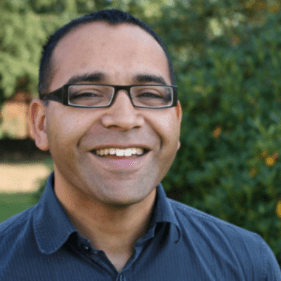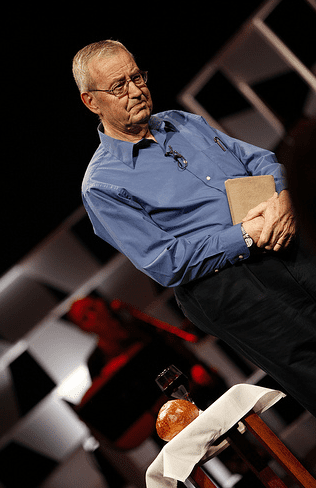 Apologetics in a postmodern world is looking less for historical proof, scientific demonstration, and systematic omniscience. Rather, it is looking for honest, open, and genuine probings that have less certitude while holding firm to belief in a good God who loves us but who has not created a world where everything ends up with happy emojis. Krish Kandiah explores in his new book the genuine paradoxes of the Bible in an open and honest manner. Paradoxology: Why Christianity Was Never Meant to be Simple will bless a new generation with a new kind of apologetics. [My blurb for the book.]
Apologetics in a postmodern world is looking less for historical proof, scientific demonstration, and systematic omniscience. Rather, it is looking for honest, open, and genuine probings that have less certitude while holding firm to belief in a good God who loves us but who has not created a world where everything ends up with happy emojis. Krish Kandiah explores in his new book the genuine paradoxes of the Bible in an open and honest manner. Paradoxology: Why Christianity Was Never Meant to be Simple will bless a new generation with a new kind of apologetics. [My blurb for the book.]
Hence, his choice of topics does not look like any apologetics textbook, so how about these?
1. The God who needs nothing but asks for everything
2. The God who is far away, so close
3. The God who is terribly compassionate
4. The God who is actively inactive
5. The God who is faithful to the unfaithful
6. The God who is consistently unpredictable
7. The God who is indiscriminately selective
8. The God who speaks silently
9. The God who is divinely human
10. The God who determines our free will
11. The God who wins as he loses
12. The God who is effectively ineffective
13. The God who fails to disappoint
[The God who has 13 paradoxes, just kidding.]
Love this assortment of topics because they are both the kinds of questions I have but more importantly the questions my college students asked and that are being asked by lay folks if we listen well.
Krish pestered his Sunday School teacher with his curious questions and then records this:
My Sunday School teacher always had an answer. One of the following usually seemed to be enough to shut me up, if only until the following Sunday morning:
‘If we could understand God, then we would be God.
‘God works in mysterious ways.’
‘Don’t be awkward – get on with your colouring.’As I sat in that hospital, with tragedy all around, I knew I could not pass on her advice. I needed more than a pat answer, a slick one-liner or a handy proof-text. I sat in silent prayer, asking God for wisdom, grace and hope. It was in that moment that I began a journey that would lead me to discover that it is often in the mysteries of life that we learn most about the mysteries of God. It is the very paradoxes of Scripture that help us to come to God most effectively when life itself is a paradox (2).
What if the tension between apparently opposing doctrines is exactly where faith comes alive? 4
Paradoxology makes a bold claim: that the paradoxes that seem to undermine belief are actually the heart of our vibrant faith, and that it is only by continually wrestling with them – rather than trying to pin them down or push them away – that we can really worship God, individually and together. 5
The Abraham Paradox is about a God who needs nothing but who asks us for everything. His words:
Here lies the heart of the paradox: an all-powerful, self-sufficient God who asks for costly worship. This paradox challenges us not just at an intellectual level, but at an emotional one. It strikes at the core of our faith, because it is about the very character of God. Is God loving, kind and compassionate? Or is he cruel, insecure and greedy? If we don’t resolve this issue we will either become miserly towards God – refusing to give him what he demands – or miserable with God – resenting giving him what he deserves. 12
But God is not just a chaplain to our consumerism, or a catalyst for our consumption. We are only part-way through this story. God gives the impossible – and he also demands the impossible. 17
The impossible? Yes, God asks Abraham to slay his own son. No sensitive reader is not bothered. If you are not bothered, you are not sensitive. God, too, has a Son who is slain. The God with no needs asks the impossible to invite us into that kind of love.
This command [to slay his son] effectively conveys three death sentences. Innocent Isaac will be killed. So will Abraham’s aspirations, and Sarah’s maternal pride and joy. In a few words from this God they’d been learning to trust, all joy, hope and life were being snatched away from this tiny family. 19
The questions this provokes are faced by Kandiah, and honest Bible readers ask these questions.
If Abraham did as God asked, he had everything to lose including his faith. What sort of God is it that asks a father to kill his young son? Who would want to follow a monster like this? Now the contradictions come thick and fast. Is the God that forbids murder telling Abraham to kill his son? Is the God that expressly forbids child-sacrifice demanding the blood of an innocent boy? Are all the promises that God made to Abraham now to be revoked? When God asks the impossible, what are the faithful to do? Do we just close our eyes and hope for the best? Is faith in God ultimately irrational? 20
Behind the demand on Abraham is a history, a narrative, a relationship, a covenant, a God who had been faithful, a God who had done the impossible, and that covenant connection to God was at the heart of Abraham’s experience:
Faith in God is not unreasonable – it is based on evidence, on the character of God, and on our experience of him in our lives; it is seeing the bigger picture and knowing that God is bigger than any earthly outcome. God can give us the impossible, and God can demand the impossible, and based on all that we know about God, we can make a considered judgement that either way, he is to be trusted. 25
The following seems trite, but read on:
Sometimes God asks us to give up what seems impossible for us to give up, only so that we can appreciate all that he has for us. 26
This I believe is right: behind the demand is the God whom Abraham had loved and trusted:
Because of his unrelenting trust in God, Abraham believed God would return Isaac to him. He led his beloved son up the mountain and raised the knife because he had unshakable confidence in God’s character, and a vision for the future. 30
Now the invitation into the life of God, the love of God, the kind of live and love that God lives and loves:
When God asks us to sacrifice much for him, we are reminded that he sacrificed everything for us. He was the Father who watched his Son climb up the lonely hill, knowing he would be the sacrifice for the world. When Abraham is asked to do what God, not he, will later bring to fulfilment, he is being brought into God’s inner circle. 31
To come close to this God we need to know what it is to enjoy relationship with him, to sacrifice like he sacrificed, to love even when it hurts, and to experience resurrection. Just as he did with Abraham, God wants to involve us in his great story of creation and rescue and redemption. 33
We may not understand, but we can see enough to know we need to follow. 34
Not entirely satisfying? Perhaps the paradox of this kind of God.









